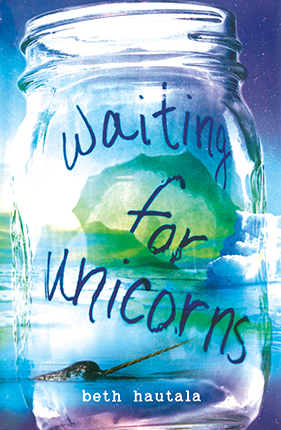| Waiting for unicorns Author: Hautala, Beth | ||
| Price: $6.50 | ||
Summary:
After her mother dies, twelve-year-old Talia McQuinn goes to the Arctic with her father, a whale researcher. Over the course of one summer, and through several unlikely friendships, Talia learns that stories have the power to connect us, to provide hope, and to pull us out of the darkness.
| Accelerated Reader Information: Interest Level: MG Reading Level: 5.30 Points: 8.0 Quiz: 173526 | Reading Counts Information: Interest Level: 3-5 Reading Level: 5.50 Points: 13.0 Quiz: 66707 | |
Reviews:
School Library Journal (00/10/14)
Booklist (11/15/14)
The Bulletin of the Center for Children's Books (00/02/15)
Full Text Reviews:
School Library Journal - 10/01/2014 Gr 4–7—It's been a terrible year for almost-13-year-old Talia. It's only been a few months since her beloved mother died from cancer, and now Dad, a whale researcher, has dragged them from their home in Woods Hole, Massachussetts, to Churchill, Manitoba (Canada) so that he can study beluga whales out on the ice. Talia used to remain at home with her mother during Dad's annual trips, but now she will live with Sura, a local Inuit woman, whom she's never met before. Clinging desperately to her special "jar of secret wishes," Talia feels like she herself is frozen and she is terrified of losing her father—a very real possibility given his dangerous profession. During the long months when Dad is away, Talia begins to explore the area (carefully, given the roaming polar bears), meets a new friend, and discovers a way to relate to Sura through her traditional storytelling, which was her deceased mother's work focus as well. Although the novel can be a bit overly earnest in parts, the deliberate wording also draws in readers and elicits an emotional response. This poignant story demonstrates that opening up to new experiences, places, and people can enrich life even in the aftermath of tragedy.—Susan Riley, Mamaroneck Public Library, NY - Copyright 2014 Publishers Weekly, Library Journal and/or School Library Journal used with permission.
Booklist - 11/15/2014 Twelve-year-old Tal is still grieving the death of her mother when she is forced to accompany her father on his research trip to the arctic. Uprooted and lost, Tal has resigned herself to the notion that she and her father have between them an unbridgeable gap in the shape of her mother, and that she will be stuck living in the home of a stranger, an Inuit woman named Sula, while her father is out searching for a pod of beluga whales. Although she makes friends with Simon, the guitar-playing grandson of another researcher, Tal’s main sources of solace are collecting wishes in a glass jar she keeps hidden under her bed and rereading the stories she and her mother studied together. Contemplative writing and the interspersion of traditional Inuit stories within the plot soften the edges of the painful process of reconnection between Tal and her father, making Hautala’s debut a thoughtful examination of loss and hope. - Copyright 2014 Booklist.
Bulletin for the Center... - 02/01/2015 In the wake of her mother’s death from cancer, twelve-year-old Talia is forced to spend the summer in the Arctic as her whale-researcher father heads out to study belugas. Churchill, Manitoba, is a small, secluded town, but it’s also the place where her parents met, and Sura, an Inuit friend of Tal’s mom, offers Tal a picture of her mother-young, carefree-that Tal has never seen before. A visiting ornithologist and his grandson also offer some insight and wisdom on grief and loss, and as Tal awaits her father’s return, her emotions thaw with the summer melt and she’s finally ready to close the “Mom-sized space” that has distanced her from her father, who has shut himself off with grief. Tal’s matter-of-fact narration of her mother’s death through flashbacks and memories has a raw simplicity to it, and her pain is evident both in the things she chooses to tell as well those she chooses to omit. While the secondary cast mainly serves as a vehicle for Tal’s healing, her process rings with authenticity-several heart-to-heart talks with her father, for example, are followed by both of them returning to their old, isolating habits, and it’s clear that their recovery will include a realistic amount of fits and starts. Hautala mines the frigid setting for some exquisitely wrought metaphors of sadness and grief, and Tal’s reflections on her situation are lyrical and yet still appropriate, given her age. Readers who were touched by Holly Goldberg Sloan’s Counting by 7s (BCCB 9/13) will find this to be a similarly moving tale. KQG - Copyright 2015 The Board of Trustees of the University of Illinois.



